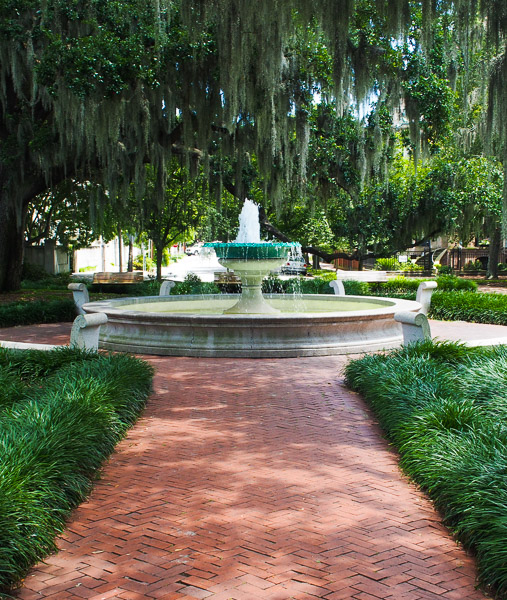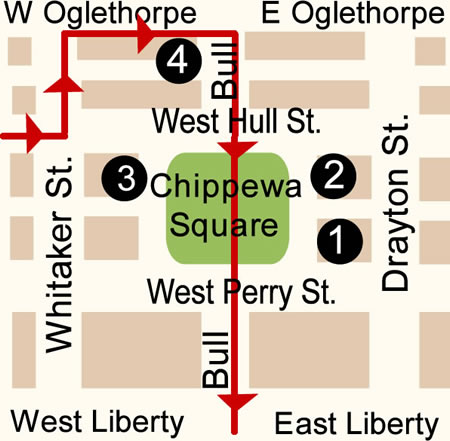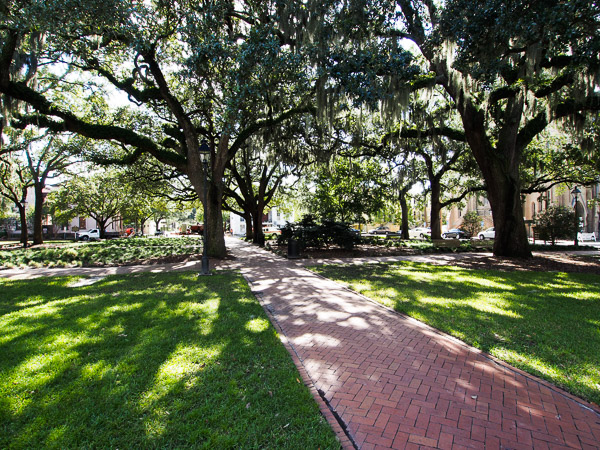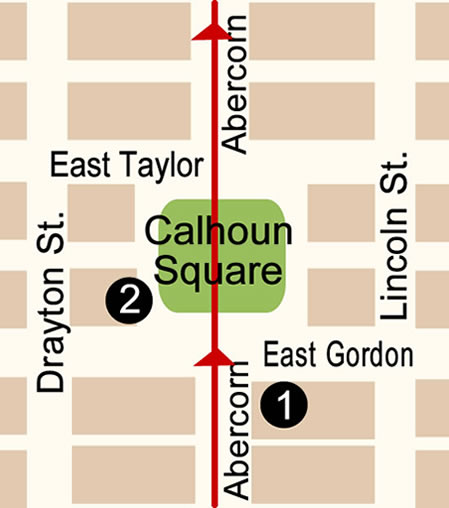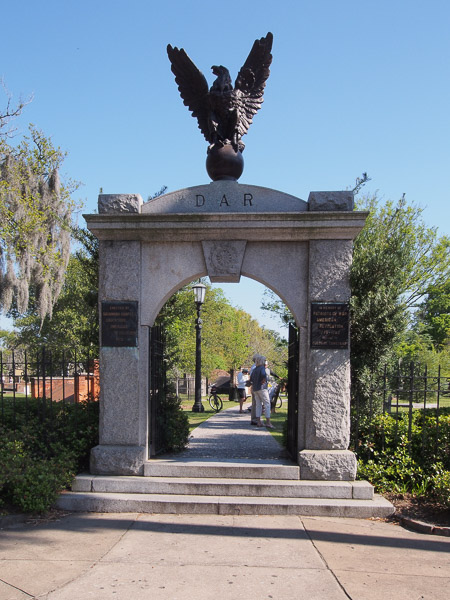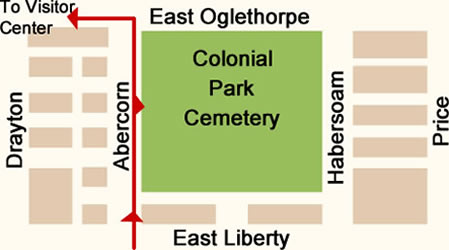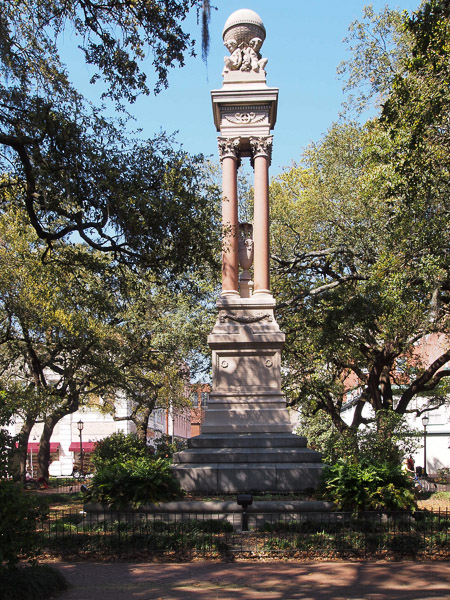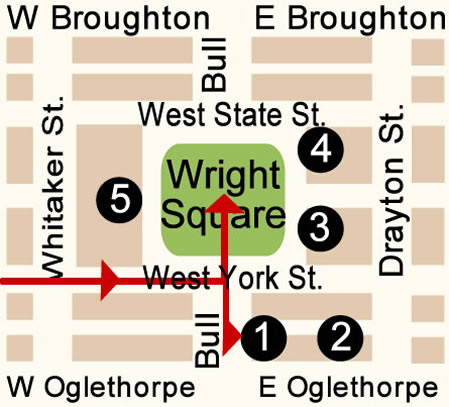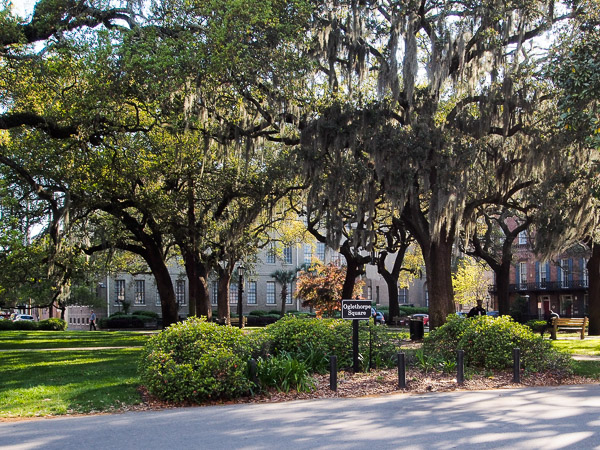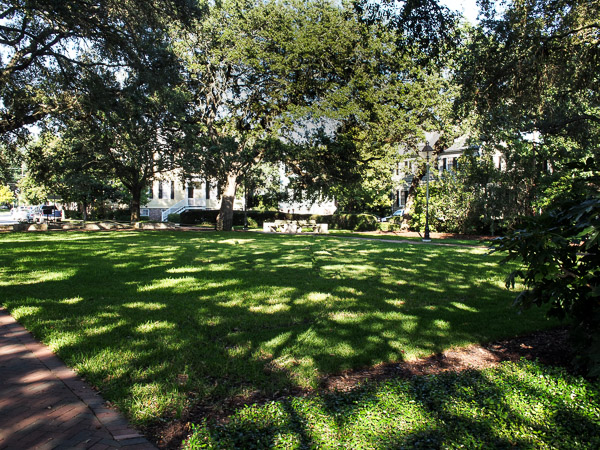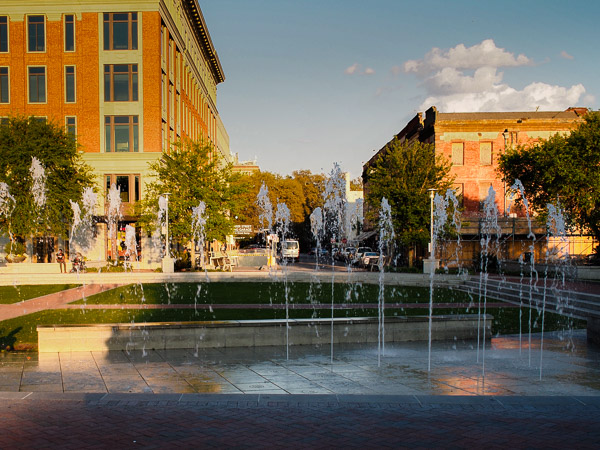What to do on a 2 Day Trip to Savannah
(Printable Ver.)
A Sample Itinerary for Day 1 of a 2 Day Visit to Savannah
-------------------------------------------------------------------------
Download the Excel Spreadsheet for a 2 Day Itinerary
-------------------------------------------------------------------------
Day 1 - Historic District South
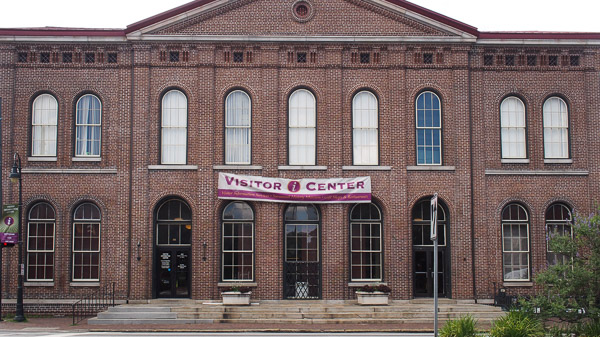
Savannah Visitor's Center
Visit theVisitors Center - 30 Min.
- Take Trolley Tour - 90 Min.
- From the Visitor's Center parking lot proceed to MLK Jr Blvd (South) and turn right.
- Walk 1/2 block and turn left on West Liberty Street.
- Walk 1 block to Orleans Square (0.3 Miles, 6 Minutes)
Orleans Square
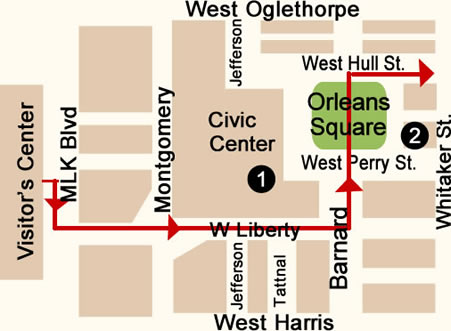
Points of Interest
 Savannah Civic Center
Savannah Civic Center
- German Societies Fountain - Center of Orleans Square
Orleans Square was laid out in 1815 and commemorates General Andrew Jackson's victory in the Battle of New Orleans. Orleans Square is located on Barnard, between Hull and Perry Streets, and is adjacent to the Savannah Civic Center.
The German Memorial Fountain stands in the center of the square. It honors the German immigrants who came to Savannah. There are several buildings designed and built by prominent architects and builders between 1800 and 1875 that are located around Orleans Square.
Leave Orleans Square and turn right on West Hull and walk 1 block to Whitaker Street and turn left, walk 2 blocks and turn right on West Oglethorpe, walk 1 block and turn right on Bull Street, walk to blocks to Chippewa Square (0.3 Miles, 6 Minutes)
Chippewa Square (One of the 5 Crown Jewel Squares)
Points of Interest:
 Philbrick-Eastman House
Philbrick-Eastman House
 Independent Presbyterian Church
Independent Presbyterian Church
Open: Fridays: 9:00a - 1:00p
- Statue of James Oglethorpe - Center of Chippewa Square
Chippewa Square was laid out in 1815, after the Revolution, and was named in honor of American soldiers killed in the Battle of Chippewa during the War of 1812.
Chippewa Square is one of Savannah’s most popular Squares. In the middle of the Square is the monument to the founder of Savannah, James Edward Oglethorpe which was placed in the square in 1910.
Chippewa Square is intersected by Hull, McDonough and Perry Streets, with Liberty Street running the southern boundary of the ward.
Buildings of interest surrounding the square are the First Baptist Church, built between 1831 and 1833 and the Philbrick-Eastman House built in 1844. The First Baptist Church is the oldest house of worship in Savannah. The Independent Presbyterian Church, built in 1891, is located on the northwest corner of the square. Also, located on Chippewa Square is the Savannah Theatre. This theatre, built in 1818, is the oldest continually running theatre in the United States.
Walk 4 blocks South on Bull Street to Madison Square (0.2 Miles, 4 Minutes)
Madison Square (One of the 5 Crown Jewel Squares)
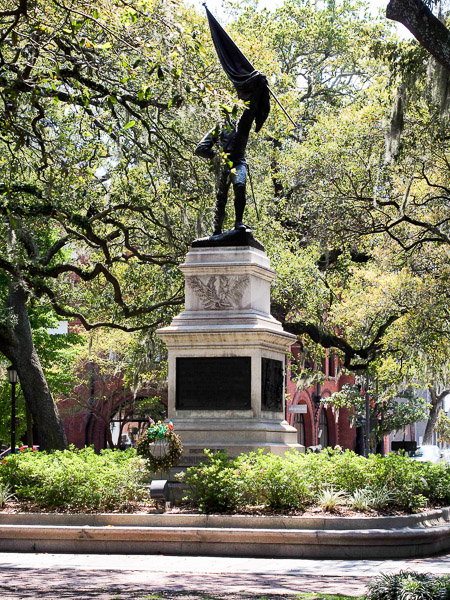
Monument to Sgt. William Jasper 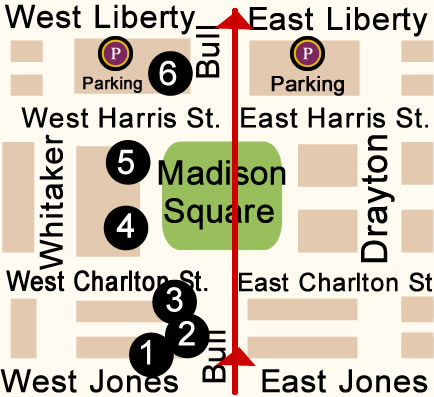
Points of Interest
 Eliza Thompson House (Bed & Breakfast)
Eliza Thompson House (Bed & Breakfast)
 Gryphon Tea Room - 337 Bull Street
Gryphon Tea Room - 337 Bull Street
 Green Meldrin House
Green Meldrin House
Tours
Thursday, Friday - 10:00a - 4:00p
Saturday 10:00a - 1:00p
Tours are 30 minutes
 Sorrel Weed House - Open to the public for tours
Sorrel Weed House - Open to the public for tours
- Monument to Sgt William Jasper - Center of Madison Square
Madison Square was named after the fourth President of the United States, James Madison. The square was laid out in 1837 and commemorates Sgt. William Jasper who fought in the Revolutionary War. In the center of the square is an 1888 statue of Sgt. William Jasper, a soldier in the Siege of Savannah who, though mortally wounded, heroically recovered his company's banner.
Madison Square also features vintage cannons from the Savannah Armory. These cannons mark the starting points of the first highways in Georgia, the Ogeechee Road leading to Darien and the Augusta Road to Augusta.
On the west side of Madison Square is St John's Episcopal Church which was built in 1853. Next door to the church is the Green-Meldrim House which was also completed in 1853. The Green-Meldrim House has beautiful iron work and unique features. On the south side is the Sorrel - Weed house built in 1841. On the southwest corner of Madison Square stands the Masonic Temple.
Leave Madison Square and walk 4 blocks South on Bull Street to Monterey Square. (0.2 Miles, 4 Minutes)
Monterey Square (One of the 5 Crown Jewel Squares)
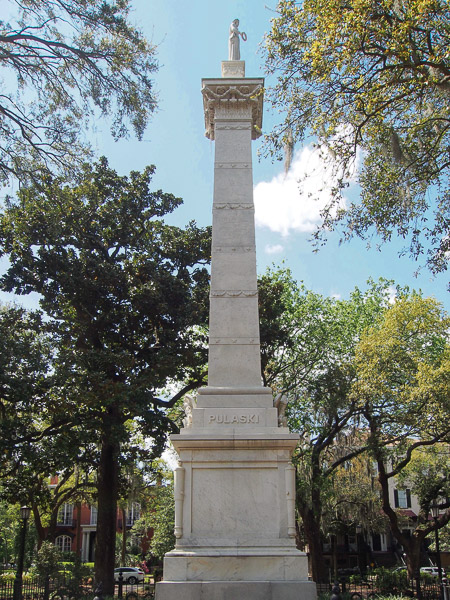
Monument to Brigadier General Kazimierz Pulaski 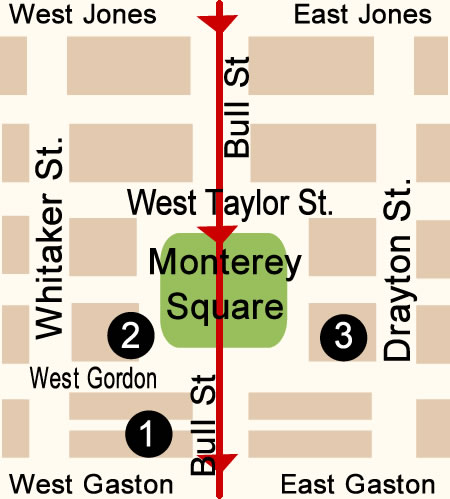
Points of Interest:
 Mercer Williams House
Mercer Williams House
Hours:
Monday - Saturday 10:30a - 3:40p
Sunday 12:30p - 4:00p
 Temple Mickve Israel
Temple Mickve Israel
Hours:
Monday - Friday 10:00a -12:00p and 2:00p - 4:00p
Closed on Jewish and federal holidays.
Tour lasts 30 to 45 minutes.
- Monument to Brigadier General Kazimierz Pulaski - Center of Monterey Square
Monterey Square was laid out in 1847 and was named to commemorate the capture of the city of Monterey, Mexico in 1846. In the center of the square is a monument built to honor General Casimir Pulaski, a Polish nobleman who came to Savannah seeking a better life and sacrificed his life in the Siege of Savannah in 1779.
Directly facing the Monterey Square is the Mercer-Williams house which was featured in the book " Midnight in the Garden of Good and Evil”. The Mercer-Williams House had begun being built around 1860 but was not completed until after the Civil War. The house was finally completed in 1871. It is located at 429 Bull Street.
This square also is home to Congregation Mickve Israel, which is one of the few Gothic-style synagogues in America, dating from 1878.
Monterey Square is located on Bull, between Taylor and Gordon Streets, and is widely considered to be the most picturesque of Savannah's squares. All of the surrounding buildings but one (the United Way Building) are original to the square.
Leave Monterey Square and continue walking 2 blocks South on Bull Street to Forsyth Park (0.1 Miles, 2 Minutes)
Forsyth Park (One of the Crown Jewels)
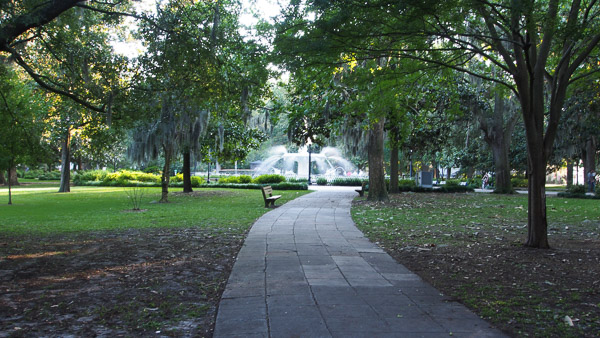
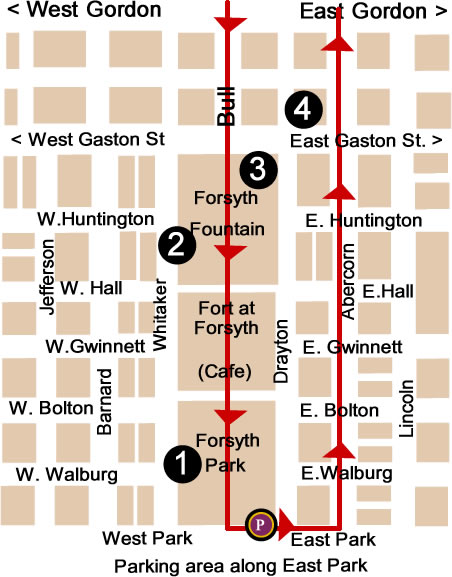
Points of Interest:
 Confederate Monument - South of the Fountain
Confederate Monument - South of the Fountain
 Fragrant Garden - Located west of the Confederate Monument and adjacent to Whitaker Street behind a wrought-iron fence.
Fragrant Garden - Located west of the Confederate Monument and adjacent to Whitaker Street behind a wrought-iron fence.
Open 9:00a - 2:00p Mondays through Fridays
Although Forsyth Park is not one of the squares, it is a must see on any tour of the Squares. It is at the very Southern end of the Historical District.
Forsyth Park is the largest park in the historic district of Savannah Georgia. It was originally created in the 1840s on 10 acres of land. In 1851, the park was expanded and named for Georgia Governor John Forsyth. Mr. Forsyth also donated 20 acres of his land to increase the park to occupy 30 acres in the historic district of Savannah. The park is bordered by Gaston Street on the North, Drayton Street on the East, Park Avenue on the South and Whitaker Street on the West. Forsyth Park is located at the southern edge of the Historic District.
Forsyth Fountain in Forsyth Park. The most popular feature of Forsyth Park is the large fountain that sits at the north end of Forsyth Park. The fountain was built and added to Forsyth Park in 1858. It resembles fountains in Paris and Peru. Every year on St. Patrick’s Day the city of Savannah dyes the water in the fountain green in celebration of Savannah's deep Irish heritage.
All around the Forsyth Park Fountain are benches. On any given day you can find many people, especially locals, lounging on the benches, relaxing, reading or taking in the scenery.
Forsyth Park is a hub of social interaction. There are people playing recreation sports, sun bathing, reading or just relaxing. On Saturdays there is a great farmer’s Market that takes place in Forsyth Park.
Today Forsyth Park features walking paths, open areas, beautiful tree cover, a fragrance garden and Savannah's magnificent Confederate Monument.
The Confederate Monument is one of the largest Confederate monuments and is located at the far end of Forsyth Park pass the fountain. This impressive monument honored local Civil War veterans as well as those who had lost their lives in the bloody conflict. The Confederate Monument was erected in Forsyth Park in 1879.
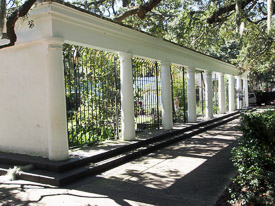 Fragance Garden |
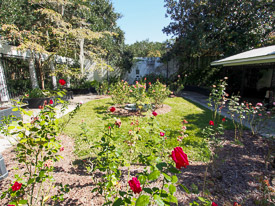 Interior of the Fragrance Garden |
Just southwest of the fountain is the Fragrant Garden for the Blind. It was created by the Trustees Garden Club of Savannah and has been around since 1963, but has only recently been opened to the public A treat for the senses, the plant name plaques also feature Braille writing. The garden is open 9am to 2pm Monday through Friday. It is located in Forsyth Park west of the Confederate Monument and adjacent to Whitaker Street behind a wrought- iron fence.
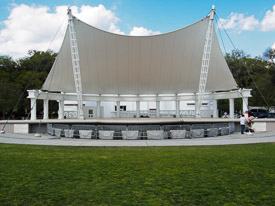 Forsyth Park Pavilion |
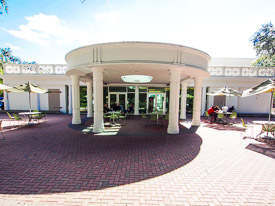 Forsyth Cafe in Forsyth Park Forsyth Cafe in Forsyth Park |
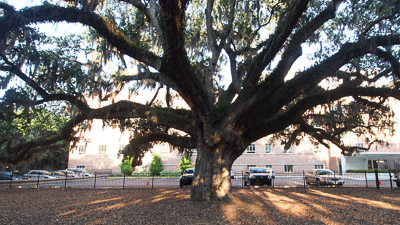
300 Year Old Oak Tree
When leaving Forsyth Park, continue walking on Drayton Street (North towards the river).
When you get to East Gaston and Drayton Street you will see The Candler 300 year Oak Tree on the right.
After seeing the Candler 300 year Oak Tree continue walking 2 blocks (North towards the river) on Drayton Street.
Turn right on East Gordon Street and walk 1 block to Calhoun Square which will be on the left. (0.1 Miles, 3 Minutes)
Calhoun Square
Points of Interest:
 Massie Heritage Center
Massie Heritage Center
Hours:
Monday - Saturday 10:00a - 4:00p
Sunday 12:00p - 4:00p
 Wesley Monumental United Methodist Church
Wesley Monumental United Methodist Church
Tours: Every Friday at 10:00a last 1 hour.
Calhoun Square was named for John C. Calhoun, known as “the Great Orator of the South. This square was laid out in 1851 along Abercorn Street. It is the only square with all of its original buildings intact. It is located on Abercorn, between Taylor and Gordon Streets.
Located on Gordon Street near Calhoun Square is the historic Massie Heritage Interpretation Museum. The school was built in 1856 with funds bequeathed by Peter Massie, to the city, which was used to educate underprivileged children.
Many beautiful homes in the Greek revival style were built around Calhoun square during the early 1800s. The elegant home at 426 Abercorn features a beautiful doorway, high stoop, marble steps and exterior details. Also, notice the wrought iron camellia on the south side of the house.
There are other beautiful homes, townhouses, row houses and the Wesley Monumental United Methodist Church, built in 1868, surrounding this square.
Leave Calhoun Square and continue walking 4 blocks North on Abercorn to Lafayette Square (0.2 Miles, 4 Minutes)
Lafayette Square
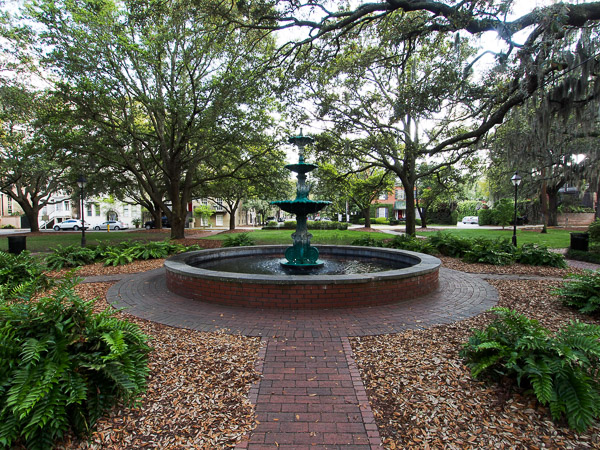
Semiquincentenary Fountain
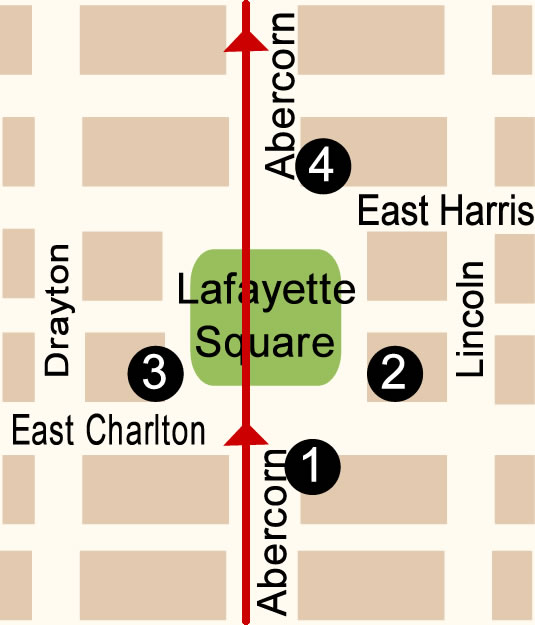
Points of Interest:
 Flannery O'Connor Childhood Home
Flannery O'Connor Childhood Home
Hours: Friday - Wednesday 1:00p - 4:00p.
 Hamilton-Turner House- (currently a Bed & Breakfast)
Hamilton-Turner House- (currently a Bed & Breakfast)
 Andrew Low House
Andrew Low House
Tours
Monday - Saturday 10:00a - 4:00p
Sunday 12:00p - 4:00p.
 Cathedral of St. John the Baptist
Cathedral of St. John the Baptist
Hours: Open to the public
Monday - Saturday 9:00a to 5:00p
- Semiquincentenary Fountain - Center of Lafayette Square
Lafayette Square is located on Abercorn, between Harris and Charlton Streets, was laid out in 1837. The square contains a fountain commemorating the 250th anniversary of the founding of the Georgia colony.
On the Northwest corner of Abercorn and Charlton Streets is the elegant Andrew Low House built in 1849. On the south side of Charlton Street is an unusual West Indies-style home built in 1852. It was designed to have the main house entered from the piazza.
The three-bay side hall townhouse in the Greek revival style at 207 East Charlton was the childhood home of prize-winning author Flannery O’Connor.
The Cathedral of St. John Baptist located at Abercorn and Harris is the oldest Roman Catholic Church in Georgia. Rebuilt from the original design following a tragic fire in 1898, the church’s Gothic revival spires can be seen throughout the city.
Leave Lafayette Square and continue walking 3 blocks North on Abercorn to Colonial Cemetery. (0.3 Miles, 5 Minutes)
Colonial Park Cemetery
201 Abercorn Street
Open:
November - March 8:00a - 5:00p
March - November 8:00a - 8:00p
Colonial Park Cemetery is located in the heart of Savannah's Historic District and served as Savannah’s primary public cemetery from 1750 to 1853. It was established in 1750 and by 1789 had expanded by 300 percent to the current size of six acres. Among those buried here are Button Gwinnett, a signer of the Declaration of Independence. This cemetery is a popular stop for local ghost tours, including one walking tour that goes right through the cemetery at night.
More than 700 victims of the 1820 Yellow Fever epidemic are buried in Colonial Park Cemetery. There are also many victims of Savannah's tragic dueling era.
The cemetery was already closed to burials before the start of the Civil War and no Confederate soldiers are buried there. But the war did leave its mark on the cemetery. Federal troops took over the cemetery grounds during their occupation of Savannah and many of the graves were looted and desecrated. It has been said that Union soldiers changed the dates on many of the headstones.
The Colonial Park Cemetery is also home to one of Savannah's most famous ghosts, that of "Rene Asche Rondolier (or Renee Rondolia Asch), a disfigured orphan who was said to have called Colonial Park his home in the early 1800s. Accused of murdering two girls whose bodies were found in the cemetery, Rene was dragged to the nearby swamps and lynched and left for dead. More dead bodies turned up in the cemetery in the days that followed. The townspeople were convinced it was Rene's ghost and some still call the cemetery, Rene's playground.
The park-like cemetery is the oldest intact municipal cemetery in Savannah. It has been closed to interments since 1853. The cemetery became a city park in 1896.
After visiting Colonial Cemetery head South on Abercorn Street 6 blocks and turn right on West Liberty Street and walk 7 blocks to MLK Blvd.
Turn right on MLk Blvd to Visitors Center on left. (0.6 Miles, 13 Minutes)
What to do on a 2 Day Trip to Savannah
(Printable Ver.)
A Sample Itinerary for Day 2 of a 3 Day Visit to Savannah
-------------------------------------------------------------------------
Download the Excel Spreadsheet for a 2 Day Itinerary
-------------------------------------------------------------------------
Day 2 - Historic District North

Savannah Visitor's Center
Visit the Visitors Center - 30 Min.
- From the Visitor's Center parking lot proceed to MLK Jr Blvd and turn left (North towards river).
- Walk 5 blocks and turn right on West Oglethorpe Avenue.
- Walk 3 blocks and turn left on Barnard Street.
- Walk 2 blocks to West York Street to Telfair Square.
- (0.4 Miles, 9 Minutes)
Telfair Square
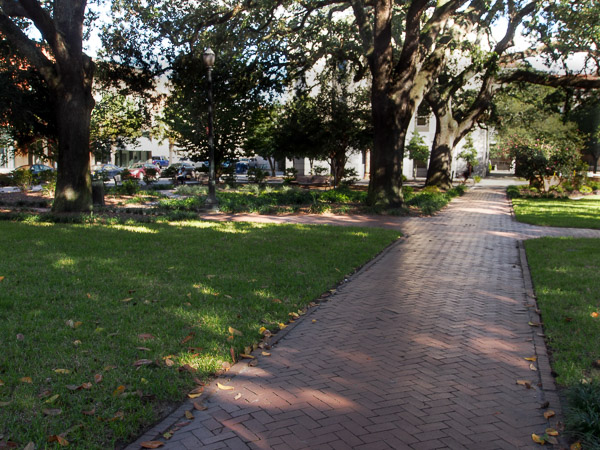
Telfair Square
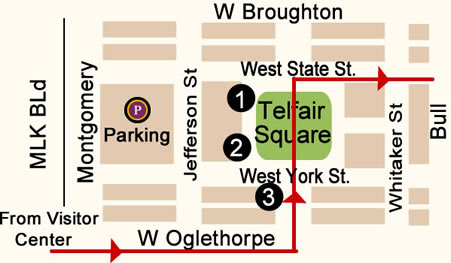
Points of Interest:
 Trinity Methodist Church
Trinity Methodist Church
Tours -Call the office at (912) 233-4766 to arrange a tour.
Office open Monday -Thursday 8:00a - 1:00p
 Telfair Academy of Arts & Sciences
Telfair Academy of Arts & Sciences
Telfair Square was the last of four squares that was laid out in 1733, before James Oglethorpe returned to England for a visit. This square was name in honor of the Telfair family and their contributions to early Savannah history and culture. Telfair Square is located on Barnard, between State and York Streets.
Mary Telfair's brother, Alexander, built one of the beautiful and notable mansions at 121 Barnard Street. This home was deeded to the city upon her death and opened as the Telfair Museum of Arts and Sciences in 1886.
The historic Trinity Methodist Church is located at 127 Barnard on Telfair Square. This Greek Revival style church was built in 1848.
Leave Telfair Square and continue walking 2 blocks (East) on West York Street and Wright Square will be on the left (0.2 Miles, 4 Minutes)
Map (Telfair Square to Wright Square)
Wright Square *****
Points of Interest:
 Juliette Gordon Low Birthplace (one block South of Wright Square)
Juliette Gordon Low Birthplace (one block South of Wright Square)
Hours: March thru October:
Monday - Saturday 10:00a - 4:00p
Sunday 11:00a - 4:00p
Hours: November thru February:
Monday, Tuesday 10:00a - 4:00p
Thursday - Saturday 10:00a - 4:00p
Closed Wednesday
Sunday 11:00a - 4:00p
 Ballastone Inn (Bed & Breakfast)
Ballastone Inn (Bed & Breakfast)
 Lutheran Church of Ascension - Open to the public from 9:00a - 2:00p
Lutheran Church of Ascension - Open to the public from 9:00a - 2:00p
- Gordon Monument - Center of Wright Square
- Tomochichi Monument - Bull Street between West State and West York Streets on Wright Square
Wright Square is one of the original 4 Squares to be laid in 1733 by General Oglethorpe. Wright Square is located on Bull, between State and York Streets.
A courthouse has stood on this square since the time of Oglethorpe. Monthly auctions of livestock, government bonds, furniture and other goods were held in Wright Square.
Wright Square was the location of the Gallows in Colonial Savannah. The hangings which took place in Wright Square were public hangings. The first jail in historic Savannah was at the north end of Wright Square in the 1700's and 1800's. If any of the prisoners were sentenced to death they were sent to the gallows in Wright Square. After they were hung their bodies were simply buried right behind the gallows. Today, there is a CVS on the site of the jail and the Courthouse stands where the gallows once stood. The post office also stands on the square. It is located on the west side and was constructed in 1898. The current courthouse was built in 1889.
The Lutheran Church of the Ascension is located on the northeast trust lot. This is one of Savannah’s most loved churches and landmarks. It was built in the Norman and Gothic styles and has one of Savannah’s most dramatic church interiors. 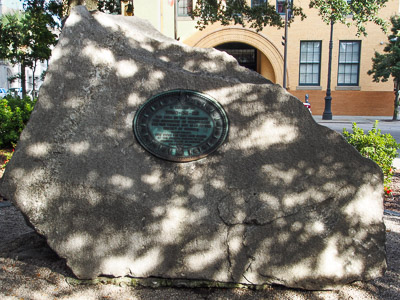
Tomo-Chi-Chi Monument Originally, the grave site of Chief Tomo-Chi-Chi, the Yamacraw chief who offered peace and cooperation with the settlers, occupied the center of Wright Square after his death in 1739. More than 100 years later, after William W. Gordon brought immense wealth to Savannah by constructing a railroad which brought cotton to the docks and wharves of Savannah from distant plantations, the Savanahians felt that he should be honored by a memorial in Wright Square. Therefore, they removed Tomo-Chi-Chi’s grave and replaced it with a monument to Gordon, which is there today.
Gordon's widow objected strongly to this perceived insult to Tomochichi. She and other members of the Colonial Dames of the State of Georgia planned to erect a new monument to Tomochichi. A massive piece of granite from Stone Mountain, purchased and planned by William Gordon’s widow and other members of the Colonial Dames of Georgia, was erected in 1899 to honor Tomochichi. Tomochichi was laid to rest on the southeast side of Wright Square.
Leave Wright Square heading North to East State Street and turn right (East).
Walk 2 blocks on East State Street to Oglethorpe Square. (0.2 Miles, 3 Minutes)
Oglethorpe Square

Points of Interest:
 Owens-Thomas House
Owens-Thomas House
Hours:
Sunday & Monday 12:00p - 5:00p
Tuesday - Saturday 10:00a - 5:00p
(Last tour leaves at 4:30p)
- President's Quarters Inn (currently Bed & Breakfast) was originally twin Federal-style mansions built in 1855.
- Moravian Monument - A granite pedestal about four feet, shaped like a fluted column, with an inscribed bronze tablet mounted on a tabloid and placed in the northeastern section of Oglethorpe Square in 1933.
Oglethorpe Square was laid out in 1742 and was named in honor of Georgia founder General James Oglethorpe. At the northeast of the square is Owens-Thomas House. It is considered, both in its day and today, Savannah’s most sophisticated house.
The Presidents' Quarters Inn, a 16-room historic bed and breakfast, is located on the southeast side. Oglethorpe Square is located on Abercorn, between State and York Streets; President Street intersects east and west.
Oglethorpe Square was the final square of the six that James Oglethorpe laid out during the time that he resided in the colony
Leave Oglethorpe Square and walk 2 blocks (East) on East State Street to Columbia Square. (0.2 Miles, 3 Minutes)
Map (Oglethorpe Square to Columbia Square)
Columbia Square

Wormsloe Fountain
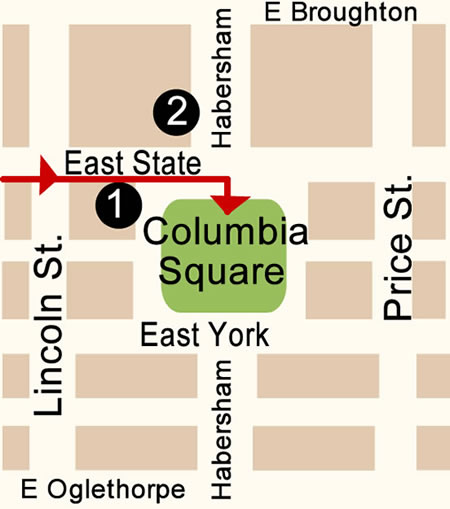
Points of Interest:
 Kehoe House (currently Bed & Breakfast)
Kehoe House (currently Bed & Breakfast)
 Isaiah Davenport House -
Isaiah Davenport House -
Hours:
Monday - Saturday- 10:00a - 4:00p
Sunday - 1:00p - 4:00p
A guided tour takes 30 to 40 minutes
- Wormsloe Fountain- Center of Columbia Square
Columbia Square was laid out in 1799 and is named for Columbia, the poetic personification of the United States. It is located on Habersham, between State and York Streets. In the center of the square is a lovely cast iron fountain imported from the Wormsloe Plantation, the estate of Noble Jones, one of Georgia's first settlers. The fountain is decorated with vines, leaves, flowers, and other woodland motifs.
Columbia Square is a lovely square shaded by four giant live oaks. Nearby is the Davenport House, built in 1812, Victorian Mansion and The Kehoe House which was built in 1892.
Leave Columbia Square on the North side and walk 4 blocks North on Habersham Street to Warren Square. (0.2 Miles, 3 Minutes)
Map (Columbia Square to Warren Square)
Warren Square
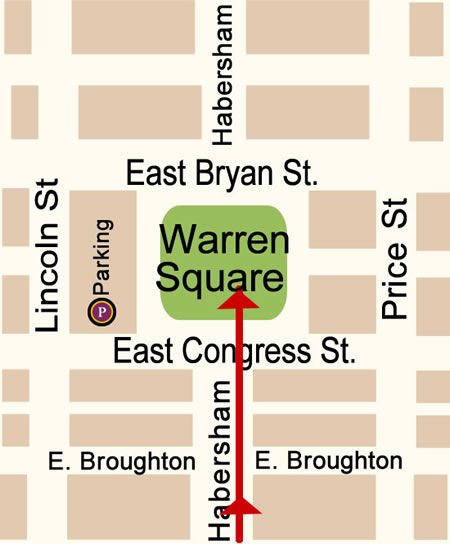
Points of Interest:
- Spencer House - 22 Habersham Street. Built sometime after 1790 and before 1804.
Warren Square was laid out after the final departure of James Oglethorpe and after the American Revolution in 1790. This square was named for General Joseph Warren, a Revolutionary War hero who was killed at the Battle of Bunker Hill. Warren Square is located on Habersham, between Bryan and Congress Streets. There are a number of historical homes near Warren Square. Many homes which were threaten with demolition were brought to Warren Square.
At 22 Habersham Street near Warren Square, George Basil Spencer had a post-colonial home built sometime after 1790 and before 1804. This was one of the most elaborate houses of its day.
Leave Warren Square at East Bryan Street and walk 2 blocks to Reynolds on the left. (0.2 Miles, 4 Minutes)
Map (Warren Square to Reynolds Square)
Reynolds Square
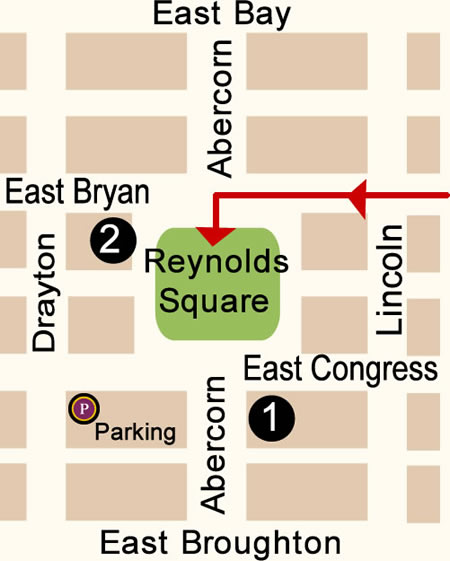
Points of Interest:
 Lucas Theatre
Lucas Theatre
Tours are available Wednesday – Saturday, 10:00a – 4:00p
Guided tours are $5 per person and available by walk-up if events allow.
The tours take approximately 20 minutes
 Olde Pink House (Is currently a Restaurant)
Olde Pink House (Is currently a Restaurant)
- Monument to John Wesley Founder of Methodism - Center of Reynolds Square
Reynolds Square was laid out in 1734 and was named for Capt. John Reynolds, governor of Georgia in the mid-1750's. A bronze statue honoring John Wesley, founder of Methodism stands in the center of the square. It is located on Abercorn, between Bryan and Congress Streets.
There are two homes of interest near Reynolds Square. The Pink House, built in the 18th century and the Oliver-Sturgis House, built in the 19th century. Today the Pink House located at 23 Abercorn Street is a fine restaurant.
Also found on Reynolds Square is the Lucas Theater, located at 22 Abercorn Street. This theater was built in 1921 and was originally designed for silent films and vaudeville and was eventually refitted for “talkies”. It was about to be demolished until a public-private partnership was formed to modernize and restore it.
From Reynolds Square exit on East Bryan and continue walking 2 blocks to Johnson Square. (0.1 Miles, 3 Minutes)
Map (Reynolds Square to Johnson Square)
Johnson Square *****
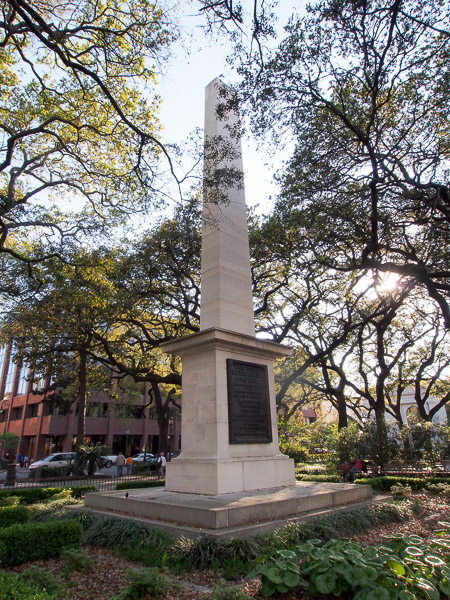
Monument to Maj. Gen. Nathanael Greene

Points of Interest:
- Monument to Maj. Gen. Nathanael Greene - Center of Johnson Square
Johnson Square was laid out in 1733 and was the first of the original squares and is still the largest. Johnson Square is located on Bull, between Bryan and Congress Streets.
Johnson Square has two fountains and a sundial. The original sundial was replaced in 1933 and it still sits today on the south side of the square. You can also find a plaque and mosaic map of the early city in Johnson Square. There is also a white marble bench in Johnson Square which pays tribute to Johnny Mercer, Savannah's popular and successful songwriter.
Johnson Square contains a tall white obelisk memorializing the Revolutionary War hero Nathanael Greene. The cornerstone was laid in 1825. Greene, who was originally buried in the Colonial Park Cemetery, was re-interred under this monument in 1902.
On the east side of Johnson Square is the Christ Church (now known as Christ Episcopal Church), called the Mother Church of Georgia. This was the first church in historic Savannah
Another landmark of Johnson Square includes the Johnson Square Business Center. This building, formerly known as the Savannah Bank Building, was the city's first "skyscraper", built in 1911. Johnson square is known as the financial district, or banking square, and many of the City's financial services companies are located here
From Johnson Square turn left on West Bryan Street and walk 2 blocks to Ellis Square. (0.2 Miles, 3 Minutes)
Map (Johnson Square to Ellis Square)
Ellis Square
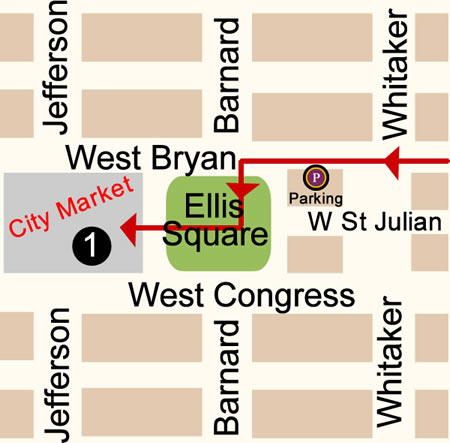
Points of Interest:
- The Fountains at Ellis Square
- Small sculptor of Johnny Mercer
Ellis Square, the city's second largest, was among the first four squares plotted by James Edward Oglethorpe in 1733. It was named for Sir Henry Ellis, Georgia's second royal governor. It is located on Barnard between Bryan and Congress Streets.
Since 1872, it was home to the City Market where farmers sold crops directly to shoppers. It was also known as Marketplace Square because it was the center of commerce from the 1730's through the 1950's. Prior to Union General Sherman's arrival in December 1864 it was also the site of a slave market.
In 1954 Ellis Square was demolished to make way for a new four-story parking garage. This loss motivated the citizens to organize Savannah's historic preservation movement and today Ellis Square has been resurrected. The city spent nearly $32 million and more than four years bringing back the 1.5-acre square.
The fountains in Ellis Square are probably the most modern in the Squares. Shooting water straight up into the air from underground, the jets of water dance around in random patterns. At night, the lights are turned on the fountain, making the jets of water colorful. Most nights the fountain is turned off at 10:00p.
On the west side of Ellis Square is a small sculpture of Johnny Mercer.
From Ellis Square continue walking 2 blocks on East Saint Julian through the City Market to Franklin Square. (0.1 Miles, 2 Minutes)
Map (City Market to Franklin Square)
Franklin Square
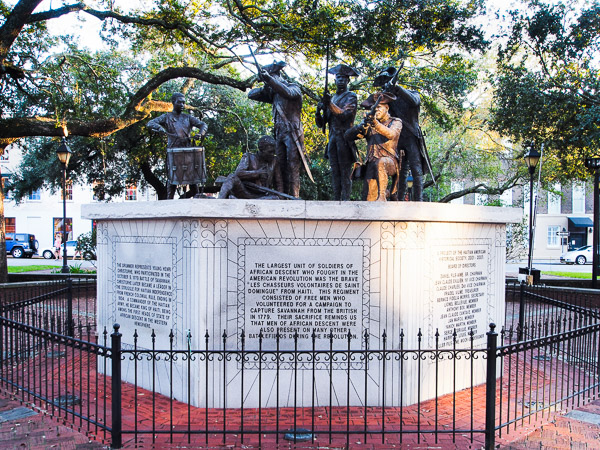
Chasseurs volontaires de Saint-Domingue Monument
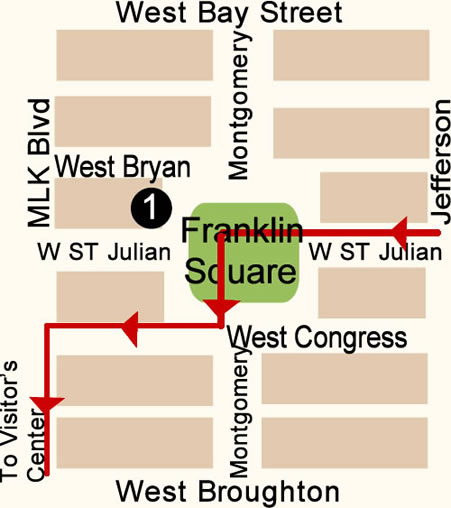
Points of interest:
 First African Baptist Church - 23 Montgomery Street
First African Baptist Church - 23 Montgomery Street
- Chasseurs-Volontaires de Saint-Domingue Monument - Center of Franklin Square
Franklin Square was established in 1790 along Montgomery Street between Congress Street and Bryan Street and was named after Benjamin Franklin.
On the west side of the square at 23 Montgomery Street is the First African Baptist Church, recognized as the oldest black Christian congregation in the country. The church was organized in 1788, 12 years before the first Baptist church for whites was built in Savannah.
Franklin Square was destroyed in 1935 when Montgomery Street became a federal route, but the square and much of the surrounding area were restored in the 1980s to commemorate the 250th anniversary of the founding of Georgia.
Exit Franklin Square on West Congress Street and turn right.
Walk 1 block to MLK Blvd and turn left.
Walk 6 blocks to Visitors Center. (0.4 Miles, 9 Minutes)
Map (Franklin Square to Visitor's Center)
For evening activities, choose one or more of the following:
- Visit the Riverfront again (North end of the Historic District, on the River).
- Take one of the many Ghost Tours (tickets can be purchased on River Street and across from the Visitor's Center).
- Catch a show at the Old Savannah Theater (Chippewa Square, Bull Street at Hull Street).
- Spend time at Forsyth Park (South end of Historic District, Corner of Bull and Gaston Streets).
